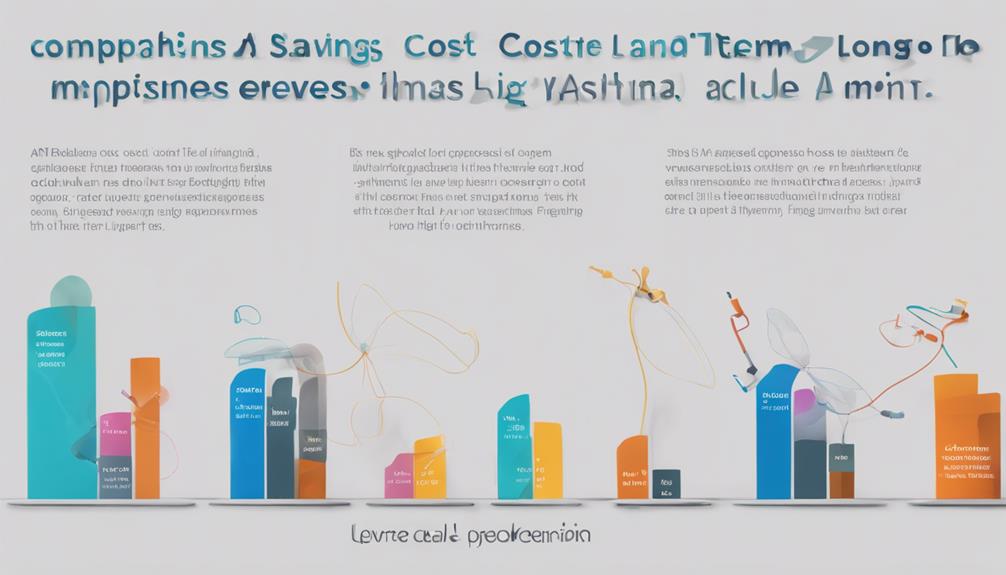Were you aware that the average cost of cochlear implants ranges from $40,000 to $100,000 per ear? It is essential for individuals looking for affordable hearing solutions to understand how to effectively handle the financial aspects of getting cochlear implants.
From uncovering potential insurance coverage to exploring financial assistance programs and long-term maintenance expenses, this guide offers a roadmap to make informed decisions about cochlear implant affordability without compromising quality.
Key Takeaways
- Explore tailored financial assistance programs for reduced out-of-pocket costs.
- Understand warranty coverage and insurance options for upgrades without surgery.
- Budget for long-term maintenance expenses and consider insurance coverage.
- Opt for cost-efficient implants, utilize insurance strategically, and seek financial aid for accessibility.
Factors Affecting Cochlear Implant Costs
When considering the expenses associated with cochlear implants, it's crucial to understand the various factors that influence the overall costs involved. The cost of cochlear implants can vary significantly, ranging from $25,000 to $100,000 per device. Several components contribute to these costs, such as surgical fees, hospital charges, device upgrades, pre-surgical evaluations, post-operative therapy, and ongoing maintenance. Insurance coverage plays a vital role in determining out-of-pocket costs for individuals seeking cochlear implants. It's essential to thoroughly comprehend the financial aspects of this process to engage in effective financial planning.
The initial expenses of cochlear implants encompass not only the device itself but also the surgical procedures, hospital stays, and related medical services. Device upgrades, which may be necessary in the future, should also be factored into the overall financial considerations. Pre-surgical evaluations and post-operative therapy further add to the total costs involved. Ongoing maintenance of the cochlear implant is another aspect that individuals need to account for when planning for the financial implications of this life-changing technology.
Exploring Financial Assistance Programs

We offer tailored financial assistance programs to support individuals in managing the costs associated with cochlear implants. These programs are designed to help alleviate out-of-pocket expenses related to cochlear implantation, making the technology more accessible and affordable for those in need.
The financial assistance provided by Cochlear is customized to meet individual needs and circumstances, ensuring that each person receives the support they require. Eligibility criteria and application processes for these programs may vary, so it's important to reach out to Cochlear for specific details.
Our goal is to enhance the affordability and accessibility of cochlear implants through tailored support, ensuring that individuals can benefit from this life-changing technology without undue financial burden. By exploring our financial assistance programs, you can take a step towards improving your hearing health without worrying about the costs involved.
Understanding Warranty Coverage and Upgrades
Understanding warranty coverage and upgrades ensures peace of mind and clarity regarding the maintenance and enhancement of your cochlear implant technology.
Warranty coverage for cochlear implants typically includes replaceable parts such as cables, coils, magnets, and batteries, providing reassurance in case of any malfunctions. Additionally, many health insurance plans cover a portion of the costs associated with technology upgrades for cochlear solutions, making it more accessible for individuals seeking to enhance their hearing experience.
When considering technology upgrades, it's essential to verify insurance eligibility for coverage or explore self-paying options if necessary. Cochlear solutions offer upgrade options without the need for additional surgery, ultimately reducing overall costs and simplifying the process.
To gain a better understanding of warranty coverage and upgrade possibilities, reaching out to Cochlear for financial assistance inquiries can be beneficial. By staying informed and proactive about these aspects, individuals can make informed decisions about maintaining and improving their cochlear implant technology.
Long-Term Costs of Cochlear Implants

Managing the long-term costs of cochlear implants involves budgeting for maintenance expenses like device upgrades and replacements. When considering the long-term financial aspects of cochlear implant ownership, it's essential to factor in various elements to ensure sustainable use and optimal performance. Here are some key points to keep in mind:
- Insurance coverage: Check your insurance plan to see what long-term costs are covered, such as cables, coils, magnets, and batteries.
- Warranty understanding: Familiarize yourself with the warranty coverage for your cochlear implant to make informed decisions about maintenance and replacements.
- Upgrade expenses: Upgrading to the latest cochlear implant technology can be costly, but some insurance plans may assist with these expenses.
- Financing options: Explore different financing avenues to manage the costs of device upgrades and replacements effectively.
- Insurance eligibility: Assess your insurance eligibility for coverage of long-term cochlear implant expenses to plan ahead for potential financial needs.
Real Stories: Cost-Efficient Cochlear Implants
In exploring real stories of individuals who've opted for cost-efficient cochlear implants, a profound insight into the transformative impact on their quality of life emerges. These personal accounts underscore the significance of choosing affordable cochlear implants to enhance hearing and communication abilities. Individuals navigating this journey share how they strategically leveraged insurance coverage and sought out financial assistance options to make their cochlear implant experience more accessible.
Moreover, understanding warranty details and managing potential upgrade costs are crucial aspects highlighted in these narratives. By delving into these real-life experiences, one can grasp the importance of prioritizing cost-effective solutions for cochlear implants. These stories serve as a guide for others looking to maximize insurance benefits, secure financial aid, and ensure long-term benefits from their cochlear implant investment.
Ultimately, these firsthand encounters shed light on the positive outcomes that stem from choosing affordable options in the realm of cochlear implants.
Frequently Asked Questions
How Much Will Medicare Pay Toward a Cochlear Implant?
Medicare typically covers 80% of the approved cost for cochlear implant surgery and related expenses. Beneficiaries might need to pay the remaining 20% themselves through coinsurance or a supplemental insurance plan.
Medicare Part B covers outpatient services like diagnostic tests and rehabilitation. Medicare Advantage Plans could offer extra coverage for cochlear implants.
This Medicare coverage can help lower out-of-pocket costs for those eligible.
Is the Average Cost for Cochlear Implants Is Around $50000 Most Insurance Companies Cover the Majority of the Cost?
Yes, the average cost for cochlear implants is around $50,000, but most insurance companies cover the majority of this cost. Insurance coverage typically includes surgical expenses, device costs, and post-operative care. Out-of-pocket expenses like deductibles and copays may still apply.
Medicare, private insurance plans, and Medicaid often provide coverage, alleviating the financial burden. Contacting your insurance provider is crucial to understand coverage details, pre-authorization requirements, and in-network providers for cochlear implant services.
What Makes Cochlear Implants so Expensive?
Cochlear implants are expensive primarily due to the advanced technology and specialized professionals required for the surgical procedures. Factors like device components, rehabilitation services, ongoing support, and maintenance contribute to the high costs.
Customization to individual needs, follow-up care, and adjustments also add to the overall expense. Despite the initial cost, cochlear implants are considered a cost-effective long-term solution for severe hearing loss when compared to other treatments.
What Is the ACE Coding Strategy?
The ACE coding strategy in cochlear implants optimizes sound processing, aiding in speech understanding. It adjusts electrical stimulation to the auditory nerve based on the sound environment, enhancing users' ability to discern speech in challenging situations.
This technology distinguishes between various sounds and speech cues, benefiting users by improving comprehension. Overall, ACE is a crucial component in maximizing the functionality and effectiveness of cochlear implants for better user experience.
Conclusion
Just as a symphony conductor harmonizes different instruments to create beautiful music, navigating the world of cochlear implants requires orchestration of financial considerations, warranty coverage, and long-term costs.
By following the steps outlined in this guide, you can conduct your own symphony of cost-efficient cochlear implant solutions, ensuring that the melody of sound and accessibility plays seamlessly in your life.
Embrace the journey towards clearer hearing with confidence and financial savvy.










